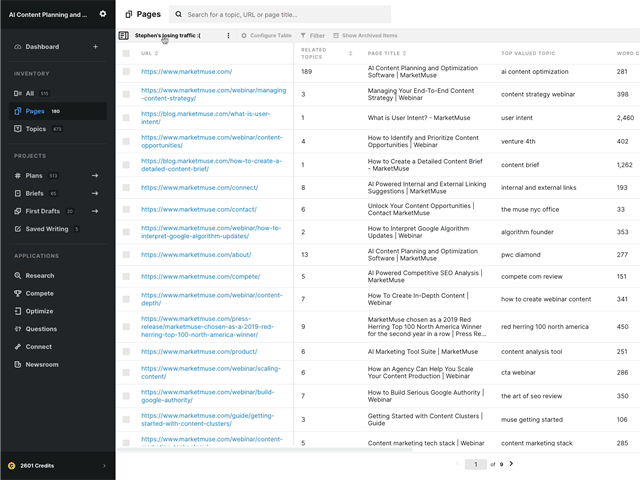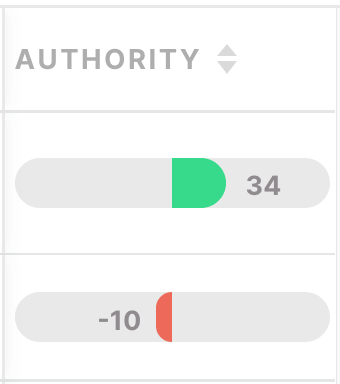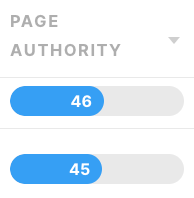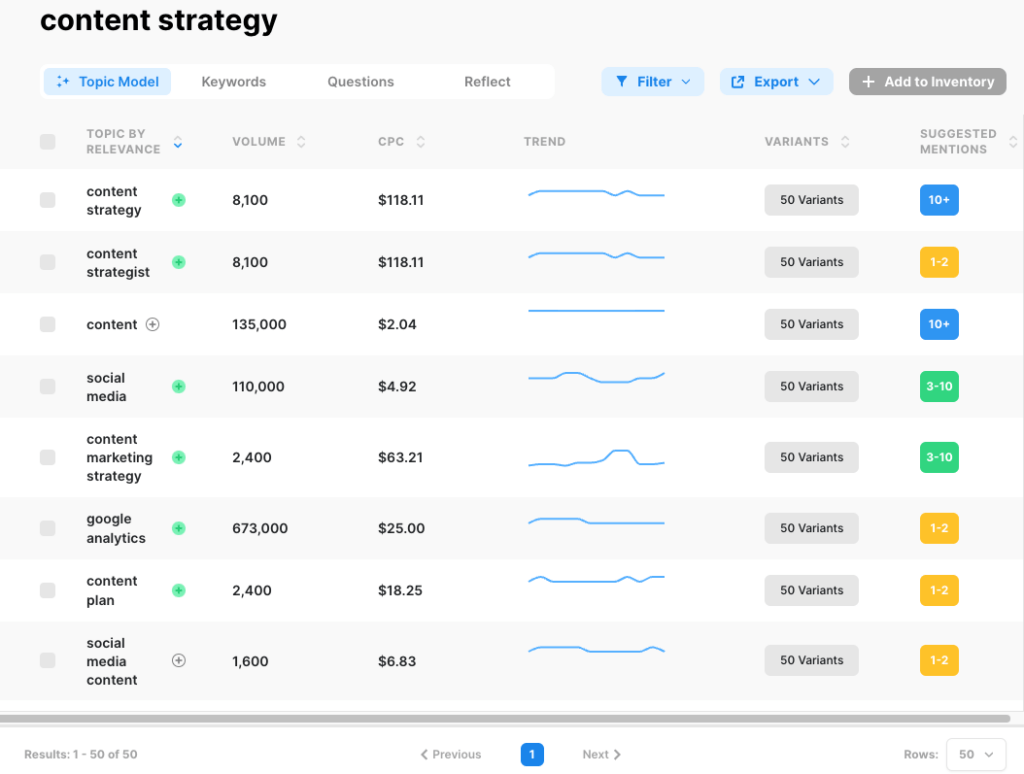What Makes MarketMuse Different
I co-founded MarketMuse years ago offering content optimization software back when it was a little-known concept. Since then we’ve gone on to dramatically expand the capabilities of the entire MarketMuse suite.
Instead of cobbling together a bunch of point solutions, our integrated platform helps content strategists and their teams make better decisions faster. So I put together this guide to help you in comparing what we offer to those individual products.

MarketMuse helps content strategists identify:
- What content to create.
- How much to produce.
- Their sites’ strengths and weaknesses.
- What quick wins are possible.
- Where foundational building efforts are needed.
What we do is a little different from your typical keyword research, providing unique value to those looking to update and optimize existing content.
On-Demand Inventory
Our on-demand inventory technology enables us to understand everything that you’re about, so we can help you do the same.
- We read all of your content and extract all of those entities.
- We show you how you rank for those topics, plus the keywords for which you already rank.
- You can add your own keyword lists.
- We can analyze an important competitor, in the same manner we study yours, to compare how you’re doing against what they’re good at.
We take all that information to determine how well you are doing, where you rank, and where you have a competitive advantage.
Inventory Views let you quickly find where those opportunities, or risks, lie. We have templates to cover virtually every case, but you can easily build your own. Share them with your entire team or keep them to yourself.

We also provide insights for any page, so you can understand all of its related concepts.
A well-written page can connect to hundreds of concepts, although it’s unlikely to be perfectly addressing all of those hundreds of intents. With MarketMuse, you can dive in to each one of those words and see how well you cover them and how well you rank. You can do intent analysis to find mismatches where the ranking is not so good, or if it’s ranking but not satisfying users.
That gives you opportunities to either update or create a cluster to better represent that intent. Doing it this way gives you a set deck where you know you’re going to win. If you’re already ranking with a less successful article or one that doesn’t address that intent, we provide a manifestation of all of those.
MarketMuse’s Content Inventory also shows topic and page combinations. That’s great when you want to see keyword data, but you want to filter it against URL information. So you can filter on the URL and see all the topics. You can also isolate one or two pages or a handful of pages and do some cluster analysis to get a deeper understanding of where you have wins and losses.
Personalized Difficulty
Keyword difficulty is a generalized metric that shows how hard it is for anyone to rank for a specific keyword. Accordingly, a website about Italian food and another one about gardening will have the same difficulty ranking for the keyword ‘pizza.’ Instinctively, we know that’s just not right.

But with MarketMuse’s personalized metrics, such as Personalized Difficulty, you can see how hard it’ll be for your site and what competitive advantage you have. That’s how we manifest our Topical Authority data point.
Topic Authority
We’re the only in-market solution that has a usable metric for Topic Authority.
This data point represents:
- The breadth and depth of coverage.
- The quality of your coverage.
- Your degree of momentum.
- A composite of off-page factors including links, social, and other components.

So we give you the most accurate representation of where you have that momentum.
Page Authority
Our Page Authority metric is also one-of-a-kind. It tells the story of how well these pages cover the topics they’re about and how much momentum they have.
- So at the site level, we’re really providing that means of understanding the pages you have, the topics you write about or the things you want to own, and how hard is it going to be to achieve those goals.

Page and Topic Authority, combined with Personalized Difficulty and Competitive Advantage show what’s required for you to own a topic. Is it going to be really hard, requiring a lot of time, money, and effort? Is it going to be a small tweak to this page? Or does it lie somewhere in the middle?
Research
MarketMuse provides unique value during the research process. We’re not simply looking at a list of string matches to find keyword data. Neither are we just doing some basic semantic connectedness.

MarketMuse research reveals:
- What topics you should cover.
- Additional keyword ideas and variants.
- Questions that you should consider answering.
- What you’re already covering and what you aren’t.
- What the search result looks like today and how those pages are structured.
- How competitors cover these topics now.
- How you are covering them.
- Ideas for internal and external linking.
Let’s take a look at this in more detail.
MarketMuse’s Topic Model
We provide a four-step solution that begins with our patented topic modeling technology. It’s a special way of analyzing what it means to be an expert. So MarketMuse goes out and looks at all the content it can find on a specific topic, sometimes looking at tens of thousands of pages.
That’s in addition to our knowledge graph that we already have in our data base. We manage over 6 billion keywords across over a hundred location-language combinations, constantly learning about what things mean. We drive that back to a list of concepts that are extremely important to cover whenever you’re doing this type of research.

One should, if they were truly an expert, cover all of these concepts — this can be extremely important to know. Looking at this expertise topic model, you start to see that, really, only an expert would know how to tie those concepts together.
You can also learn about intents if you see brand names, people’s names, or locations. It doesn’t necessarily mean you need to mention that location, but it means people care about those intents. You may want to also cover them; maybe if it’s a competitor, people have a research intent or a comparison.
We also provide keyword variants at this stage. So you can see the ways that people are thinking about the solution, about this particular topic and which ones you have existing coverage on.
Keywords
The keywords we surface are more like a substring match. That’s a combination of some things that you commonly expect when expanding a keyword, so you can also get some additional value. There can be hundreds of entries in this cluster to supplement the 50 items in the topic model along with the hundreds of variants.
Questions Analysis
If someone was researching this subject, these are the questions they’d be thinking about. They may not be a perfect fit for this page, but they’re intents that are around it. All of these things are combining to build a research cluster that tells the story of semantic relatedness and user intents.
Reflect
Only MarketMuse connects your research with your content inventory so you can simultaneously see what you’ve already covered, what you haven’t, and how it’s performing. So it’s a quick lens on that site-level coverage.
You can sort by Topic Authority, Personalized Difficulty (to find easy wins). You can look at the ones we’re ranking for and not ranking for even search volume to understand where there might be some areas of opportunity.

So we’re getting a site level gap analysis that dives deep and understands everything we currently cover. If it’s not here, we’ve got nothing. If we’ve got no rankings, we’ve got no meaningful pages.
SERP X-Ray
SERP X-Ray shows you what the search results page looks like right now, so you can see the SERP features. It reveals the role images play (are there a lot or not?) and video as well. MarketMuse shows the number of in-content external and internal links. You can also see the average Content Score. That’s MarketMuse measure of quality and comprehensiveness. Plus, it shows the intent and indicates the high-level structure.

Now you can dive deep and look at each one of these pages in detail:
- Where am I inferior?
- Where am I superior?
- Do I have a shorter page?
- How does my Content Score compare?
- What about the sections?
- Does my page match the search intent?
- What about images and videos?
- Internal and external links?
So it gives us a sense of the general structure of our existing page against the averages.
Heatmap
We take that a step further with our heat map solution, where we show you exactly what those competitive articles are. You can see where you are, from the standpoint of comprehensiveness, and dive in to understand why.
What are the concepts that you cover that competition doesn’t, and vice versa? What are items that nobody’s covering, but MarketMuse says are extremely important?
Those are my favorites. I often say the money’s in the red lines because those are things not a lot of people talk about, but through analysis MarketMuse has determined is important.
This is awesome for writers because we’re telling them not only the things they have to do because everybody else is. We’re also helping them differentiate their content. We’re telling them how to be more like an expert, and we also show two views.

One view reveals the stuff nobody’s covering and the other shows what everybody’s obviously covering. If you miss these, you completely miss the boat.
So we’re not just showing you what everybody else is doing.
MarketMuse provides a unique value over other solutions that just look at keyword density of the top ranking pages, and then do a sort descend. That’s called co-occurrence analysis or term frequency inverse document frequency.
You might have heard of it as correlation SEO or TF-IDF. It doesn’t work, right? It doesn’t work at scale.
It gives you only one lens. You want to know those things, but it doesn’t work in isolation, and it can lead to some seriously over-optimized pages. So what we do is we give you the best of both worlds.
What would an expert do? What are they doing? Let’s take all of those things into consideration when we’re optimizing.
Content Cluster Analysis
The last thing on this front is we also provide the world’s only content cluster analysis solution. So we can dive in and see the extent of our cluster, what content we have on a topic and how well it covers the subject.
With our on-demand cluster analysis, you can discover blind spots across your entire cluster. Where are the gaps? Do we need an individual page for that concept? And then weave it into this infrastructure.
By the way, you can apply this same process to your competitors as well.
So cluster analysis like this, a 40-hour process I used to have to do, is now done in seconds.
Connect
We also show you a high level internal and external linking recommendation solution that takes pieces of that topic model that we think would be easiest to integrate through internal links.
We also show you some external links. If you have multiple sites in your network, we’ll show you cross-linking opportunities. But we can also do named competitors and show you them along with stuff you don’t wanna link to, right? All of that is baked into our research solutions.
Optimize
Our Optimize solution gives you an editor’s or an optimization professional’s view of that content. You can scroll through it and see where you mention words that are in the topic model. Where do you have topic relatedness throughout? This is a beautiful thing to see a lot of green throughout and even distribution.
You can also see these topics to understand where you have absolute gaps. These are things that, if you were an expert, you’d’ve elegantly included them in the article.
It also could give you ideas. Maybe you had a blind spot on this article. You might need an additional page to connect. So you get a quick lens on your article’s comprehensiveness.
You can also look at the competitive landscape, so you can compare yourself head to head. Once more, you can see where you have gaps. Is there anything your competitor covered that you didn’t?
So you can do a head-to-head gap analysis with people that maybe are out ranking you, to level up. Maybe you wanna talk about those items you missed. You can learn how to update your page from that simple analysis.
Here’s the key — we’re not just telling you how to copy your competition. We’re building the topic model as a lens of expertise and quality, and showing you what your competitors do so that you can make decisions that are great from an editorial perspective and from a perspective of how to level up your search engine optimization performance.
MarketMuse AI
MarketMuse AI is a powerful tool that helps you create content that grabs your audience’s attention and influences them. It combines advanced language models and knowledge graphs to enhance your content’s quality and optimize it for search engines. With MarketMuse AI, you can save time, unleash your creativity, and stay informed with the latest industry knowledge, making it your secret weapon for crafting standout content that drives success.
Takeaway
MarketMuse is an AI-powered platform that helps content strategists determine what content to create and why. It provides valuable insights and analysis on existing content, including keyword rankings, competitor analysis, and topic coverage.
Our on-demand inventory technology reads all your content and extracts entities to help you understand your site’s strengths and weaknesses. You get a more accurate representation of your website’s potential and what’s required to own a topic, thanks to MarketMuse’s personalized metrics such as Personalized Difficulty and Topic Authority.
And our patented topic modeling technology takes your research process to a whole new level. It analyzes what it means to be an expert in a specific topic and provides a list of important concepts to cover.
Only MarketMuse provides a comprehensive solution to help content strategists make informed decisions and improve their website’s content.
What you should do now
When you’re ready… here are 3 ways we can help you publish better content, faster:
- Book time with MarketMuse Schedule a live demo with one of our strategists to see how MarketMuse can help your team reach their content goals.
- If you’d like to learn how to create better content faster, visit our blog. It’s full of resources to help scale content.
- If you know another marketer who’d enjoy reading this page, share it with them via email, LinkedIn, Twitter, or Facebook.
